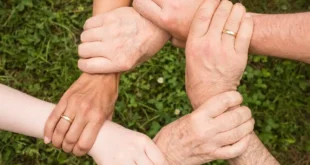Dating a girl can be a wonderful and exciting experience, but it can also be challenging and intimidating. It’s important to remember that confidence is key when interacting with others, especially when it comes to romantic or social situations. Remember, confidence is something that can be developed over time. Be patient with yourself and keep working on building your confidence. Here are a few tips to help you navigate the dating process:
Be Confident
Confidence is a crucial aspect of personal and professional success, and it is especially important when it comes to dating. When you exude confidence, you come across as someone who is self-assured, comfortable in their own skin, and easy to be around. This can make you more attractive to potential partners, and it can also help to put them at ease.
Confidence is a key trait that many people strive to possess. It is the belief in one’s abilities, qualities, and judgment. When we are confident, we are more likely to take risks, pursue our goals, and achieve success. However, confidence can be difficult to come by, especially in situations where we may feel uncertain or insecure.
Basically, Confidence is a combination of self-esteem and self-efficacy. Self-esteem is the belief in one’s own worth as a person, while self-efficacy is the belief in one’s own abilities to accomplish a specific task or goal. Together, these two traits make up our overall level of confidence.
How to Develop Confidence
Confidence can be developed through a variety of methods. Here we will explore some tips for confidence development:
Tip 1: One way is to set small, achievable goals and then work to achieve them. This can be as simple as setting a goal to speak up more in meetings at work or to try a new hobby. As we achieve these small goals, our confidence in our abilities will grow.
Tip 2: Another way to develop confidence is through positive self-talk. This means talking to ourselves in a positive and encouraging way, rather than putting ourselves down. This can be as simple as reminding ourselves of our strengths and accomplishments, rather than focusing on our weaknesses.
Pro Tip: Learning from failure is an important aspect of building confidence. Failure is inevitable, but it is how we react and learn from our mistakes that can make all the difference. Instead of dwelling on our failures, we should focus on what we can learn from them and how we can use that knowledge to improve in the future.
Be Respectful
Being respectful is an important aspect of human interaction, and it is a virtue that is essential for building strong and healthy relationships with others. Respect is the foundation of trust and is essential for creating a positive and productive environment in any setting.
How to be Respectful?
Tip 1: To be respectful, one must first understand the importance of treating others with dignity and kindness. This means recognizing the inherent worth and value of every individual, regardless of their background, beliefs, or circumstances. It also means listening to others with an open mind and actively trying to understand their perspectives and experiences.
Tip 2: Being respectful also means being mindful of one’s own behavior and actions. This means refraining from engaging in hurtful or harmful behavior, such as name-calling, bullying, or discrimination. It also means being aware of one’s own biases and actively working to overcome them.
Tip 3: Another important aspect of being respectful is being considerate of others’ feelings and needs. This means being aware of how one’s actions and words may affect others, and taking steps to minimize any negative impact. It also means being willing to apologize and make amends when one’s behavior has caused harm or offense.
Tip 4: Being respectful also means being willing to compromise and work towards finding common ground with others. This means being open to different ideas and perspectives, and being willing to make concessions in order to find a solution that works for everyone.
Pro Tip: Respect is a two-way street, and it is important to remember that it must be earned as well as given. By treating others with kindness and consideration, and by being mindful of one’s own behavior and actions, one can earn the respect of others and create a more positive and harmonious environment.
Respect is an essential virtue that is essential for building strong and healthy relationships with others. It is the foundation of trust and it is essential for creating a positive and productive environment in any setting.
Be a Good Listener
Being a good listener is another vital skill in personal and professional settings. It involves paying attention, understanding, and responding to what others have to say. Here are a few key tips to help you become a better listener:
How to become a Good Listener?
Tip 1: Give your full attention. When someone is speaking to you, make sure to put away distractions like your phone or computer and give them your full attention. This shows that you value what they have to say and are interested in what they are saying.
Tip 2: Ask clarifying questions, if you don’t understand something that the person is saying, don’t be afraid to ask for clarification. This not only helps you to understand what they are saying better, but it also shows that you are actively engaged in the conversation.
Tip 3: Avoid interrupting, everyone has something important to say, so it’s important to give them the time and space to say it. Avoid interrupting them to share your own thoughts or opinions until they have finished speaking.
Tip 4: Reflect on what they are saying. After the person has finished speaking, take a moment to reflect on what they have said. This helps you to better understand their perspective and to respond in a thoughtful and meaningful way.
Tip 5: Show empathy, when someone is speaking to you, try to put yourself in their shoes and understand how they are feeling. This helps you to connect with them on a deeper level and to respond in a way that is supportive and understanding.
Tip 6: Avoid making judgments or assumptions about what the person is saying. Everyone has different experiences and perspectives, so it’s important to keep an open mind and respect their point of view.
Pro Tip: Practice active listening, it’s a technique that involves paying full attention to the speaker, providing verbal and non-verbal cues that indicate you are listening, and asking questions or making comments that show you understand the speaker’s message.
By following these tips, you can become a better listener and improve your relationships with others. Whether it’s a conversation with a friend, a meeting at work, or a discussion with a family member, being a good listener can help you to connect with others in a deeper and more meaningful way.
Communicate Openly
Communicating openly is a basic component of any successful relationship, whether it’s between colleagues, friends, or family members. Open communication allows for the free exchange of ideas, thoughts, and feelings, which in turn leads to better understanding and more effective problem-solving.
How to Communicate Openly?
Tip 1: One of the most important aspects of open communication is being able to express oneself honestly and clearly. This means being able to speak one’s mind without fear of judgment or retaliation, and being able to actively listen to others when they speak. It’s important to remember that open communication is a two-way street, and that both parties need to be willing to engage in honest dialogue in order for it to be effective.
Tip 2: Another key aspect of open communication is being able to give and receive feedback in a constructive manner. This means being able to provide honest and specific feedback about one’s thoughts and feelings, while also being able to take feedback from others without becoming defensive. Giving and receiving feedback can be difficult, but it’s essential for growth and improvement in any relationship.
Tip 3: Open communication also requires being able to manage conflict in a healthy and productive way. Conflicts are inevitable in any relationship, but how they’re handled can make all the difference. Instead of avoiding or ignoring conflicts, it’s important to address them head-on and to use effective communication skills to find a resolution that is fair and just for all parties involved.
Tip 4: In order to foster open communication, it’s important to establish clear boundaries and expectations. This means setting clear guidelines for how communication should occur, and what is and isn’t appropriate behavior. It’s also important to respect the boundaries and expectations of others and to avoid crossing any lines that may cause offense or harm.
Pro Tip: It’s also important to be aware of and sensitive to cultural and individual differences in communication styles. People from different backgrounds may have different communication styles, and it’s important to be aware of and respectful of these differences in order to effectively communicate with one another.
Open communication requires time, effort, and patience. It takes time to build trust, and open communication can’t be forced. It takes effort to be able to express oneself honestly and clearly and to actively listen to others. And it takes patience to work through conflicts and to give and receive feedback.
Open communication is essential for maintaining healthy and productive relationships. It allows for the free exchange of ideas, thoughts, and feelings, and leads to better understanding and more effective problem-solving.
Practice Good Self-Care
Self-care is an essential aspect of maintaining a healthy lifestyle and overall well-being. It is the practice of taking care of one’s physical, mental, and emotional health. The following are some tips for practicing good self-care.
Tip 1: Getting a good night’s sleep is crucial for maintaining physical and mental health. Aim for 7-9 hours of sleep each night, and establish a regular sleep schedule. Avoid screens for at least an hour before bed and create a relaxing bedtime routine.
Tip 2: Eating a balanced diet is important for maintaining physical health. Include a variety of fruits, vegetables, whole grains, and lean proteins in your diet. Avoid processed foods and sugary drinks, and limit your intake of alcohol and caffeine.
Tip 3: Regular exercise is important for maintaining physical and mental health. Aim for at least 30 minutes of moderate-intensity exercise, such as brisk walking or cycling, every day. You can also include strength training and stretching in your exercise routine.
Tip 4: Stress can have a negative impact on both physical and mental health. Take time each day to relax and unwind. This can include activities such as reading, listening to music, meditating, or taking a bath.
Tip 5: Setting and achieving goals can be a great way to boost self-esteem and motivation. However, it is important to set realistic goals that are achievable within a reasonable timeframe.
Tip 6: Practice Mindfulness; mindfulness is the practice of being present and fully engaged in the current moment. It can help reduce stress and increase self-awareness. Try incorporating mindfulness practices such as meditation, yoga, or journaling into your daily routine.
Pro Tip: Take Care of Your Emotional Health, it’s just as important as physical health. It’s important to take care of your emotional well-being by expressing your feelings, learning healthy ways to cope with stress, and seeking professional help if needed.
Incorporating the above tips into your daily routine can help you practice good self-care and improve your physical, mental, and emotional health.
Take Risk
First and foremost, taking risks allows us to achieve our goals. Whether it’s starting a business, choosing a life partner, applying for a new job, or going on a trip, taking risks opens up opportunities for success. Without taking risks, we would be stuck in our comfort zones, never experiencing the thrill of victory or the agony of defeat.
In addition, taking risks allows us to learn and grow as individuals. When we take risks, we expose ourselves to new experiences and challenges. We learn how to adapt to new situations and develop new skills. This helps us become more resilient and better equipped to handle difficult situations in the future.
Furthermore, taking risks can lead to personal fulfillment and satisfaction. When we take risks, we push ourselves out of our comfort zones and achieve things we never thought possible. This can lead to a sense of pride and accomplishment that is hard to come by in any other way.
How to Evaluate the Risks
It is important to note that taking risks doesn’t mean being reckless. It is important to evaluate the risks and benefits of a given situation before making a decision. This can help us make more informed decisions and minimize the potential for negative consequences.
Tip 1: When evaluating risk, it’s important to consider the potential consequences of the decision. If the potential consequences are severe, it may be best to avoid the risk altogether. On the other hand, if the potential benefits outweigh the potential consequences, it may be worth taking the risk.
Tip 2: Another important factor to consider when evaluating risk is the likelihood of success. If the likelihood of success is low, it may not be worth taking the risk. However, if the likelihood of success is high, it may be worth taking the risk even if the potential consequences are severe.
Pro Tip: Once you have evaluated the risks and benefits of a given situation, it’s important to develop a plan to mitigate the potential negative consequences. This can include developing a backup plan, identifying the resources you will need to succeed, and working with a team of trusted advisors.
“With the right approach, taking risks can lead to personal fulfillment and satisfaction”
Learn to Handle Rejection
Last but not the least, handling rejection is an important skill to develop in life, whether it is in a personal or professional setting. Rejection can come in many forms, such as being passed over for a job, being rejected by a romantic partner, or not being accepted into a school or program. It can be difficult to deal with rejection, but there are ways to handle it that can make the process less painful and even lead to growth and opportunities.
“First, it’s important to remember that rejection is not a reflection of your worth as a person. Just because someone or something doesn’t want you, it doesn’t mean that you are not good enough. Rejection can be a sign that something else is a better fit for you, and it can open the door for new opportunities.”
How to Handle Rejection?
Tip 1: Take time to process your feelings, and allow yourself to feel the disappointment, hurt and anger that come with rejection. It’s okay to grieve the loss of what could have been. But don’t let yourself dwell on those negative feelings for too long. Give yourself a set amount of time to process your emotions, and then focus on moving forward.
Tip 2: Try to learn from the experience. Reflect on what went wrong and consider what you could do differently in the future. Take responsibility for your actions, but don’t blame yourself. Remember that rejection is not always a reflection of your abilities, but sometimes it’s just a reflection of the person or situation.
Tip 3: Reach out to friends, family, or a therapist for support. They can help you process your feelings and offer a different perspective. They can also remind you of your strengths and help you focus on the future.
Pro Tip: One of the best ways to handle rejection is to keep a positive attitude and maintain a sense of perspective. Remember that rejection is a part of life, and it happens to everyone. Look at rejection as a learning experience and an opportunity to grow. Remember that rejection is not the end, but the beginning of something new. Rejection can be a setback, but it doesn’t have to be a defeat. Keep pushing forward, and don’t let rejection define you. Keep looking for new opportunities, and don’t be afraid to put yourself out there again. Remember that rejection is not the end, but a new beginning.
Final Thoughts
Dating can be tricky and complicated, but with the right mindset and approach, it can be a fun and rewarding experience. When dating a girl, it’s important to be respectful, considerate, and understanding of her feelings. Show interest in her life and passions, and make an effort to get to know her as a person. Be honest and open with your intentions, and be willing to listen and communicate effectively.
It’s also important to respect boundaries and take things at a comfortable pace for both parties. Don’t be too pushy or try to rush into a relationship. Instead, take the time to build a strong foundation of trust and understanding. Be willing to compromise and work through any conflicts that may arise.
Lastly, remember that dating should be enjoyable, not stressful. Don’t put too much pressure on yourself or the relationship. Instead, focus on having fun and building a meaningful connection with the person you’re interested in. Remember to be yourself and let the relationship develop naturally. Happy dating!
 SlushWeb Live the Way You Love
SlushWeb Live the Way You Love



